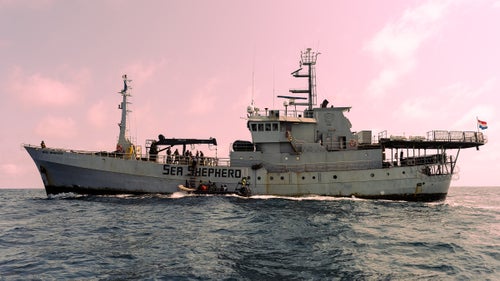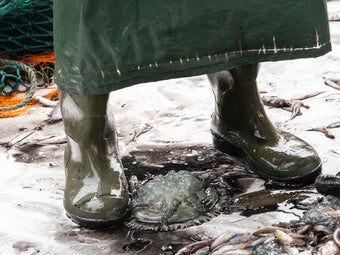Sea Shepherd’s Sea Change
The oceans need protection like never before, and the environmental organization is redefining itself. The original focus—dramatic campaigns against whalers and seal hunters operating under the flags of nations like Japan—is giving way to an emphasis on fisheries protection in cooperation with governments. Tristram Korten rides along with Peter Hammarstedt, the Swedish activist at the heart of this strategy.
New perk: Easily find new routes and hidden gems, upcoming running events, and more near you. Your weekly Local Running Newsletter has everything you need to lace up! .
On a cloudy, moonless night in Port-Gentil, Gabon, on Africa’s west coast, Peter Hammarstedt watched as the red and green running lights on a pair of motorboats slid across a mangrove-fringed estuary. He clicked his two-way radio. “Keep coming,” he said, guiding the rigid-hulled inflatable boats, or RHIBs, to the dock. Huddled in the dark behind the 38-year-old director of campaigns for the ocean conservation group were three Gabonese fisheries officers, six Gabonese marines with AK-47’s slung over their shoulders, two academic researchers, and me. After we’d all climbed in, the pilots switched off the running lights, pointed their bows west, and gunned the twin 200-horsepower engines straight into the dark.
Somewhere ahead of us drifted the Bob Barker, a 171-foot Sea Shepherd ship named after the late Price Is Right host, who’d donated $5 million a dozen years ago to purchase the vessel. The Bob was scheduled to run a monthslong patrol in partnership with the Gabonese government to combat illegal, unreported, and unregulated fishing, or IUU fishing for short. To do this effectively, the ship’s presence had to be kept secret, so the Bob was dark—waiting for us more than ten miles from shore with its deck lights switched off and its portholes covered. The ship’s automatic identification system was off, and its crew maintained radio silence. Although we didn’t see them, we’d motored past several Chinese and African fishing trawlers whose crews would have spread the word had they seen the Bob. Informers for the pirate networks that prowled these waters would also have relayed the ���Dz�’s location. (The day before, Hammarstedt received a navy communiqué about pirate sightings to the north, off the coast of Libreville, the nation’s capital.)
“It’s nice to be in the boat with the guys with guns for once,” Hammarstedt joked as the RHIB bounced along, its wake glowing with blue bioluminescence and Port-Gentil’s lights slimming to a thin bright line off the stern. After 20 minutes speeding into the darkness, the boats slowed, and suddenly the Bob emerged from the gloom. Aided by headlamps, we climbed rope ladders to the darkened deck as the RHIBs were winched aboard with our gear. Hammarstedt quietly walked to the bow, patted the rust-pitted steel stanchion of the 72-year-old ship, and muttered, “Good to see you, old girl.”
Hammarstedt had a long history with the Bob; for 11 years, he’d captained it across four oceans in pursuit of whaling boats and illegal fishing operations. But the vessel was old, and upkeep was expensive. In the end, Hammarstedt’s was the lone no vote when Sea Shepherd Global’s four-member board voted to scrap it in 2021. This would be its final patrol. In a few months, the crew would motor to Turkey; Hammarstedt had arranged to be there when the ship was dismantled piece by piece. A replacement had already been bought with the help of a donor. So Hammarstedt stood in the bow and let the nostalgia flow. Behind him hung the ship’s brass bell, which he planned to make a keepsake of when the cutting started. Then, with a shrug, he turned and headed back. He needed his rest. There was work to be done, and it was late.












